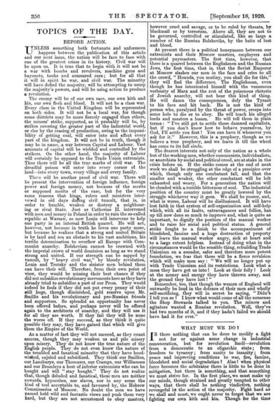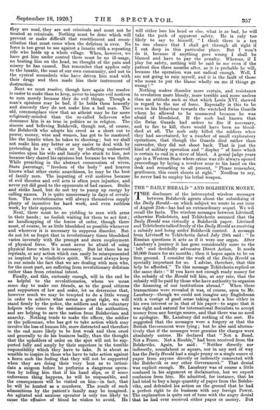WHAT MUST WE DO I I S there nothing that can
be done to modify a fight not for or against some change in industrial remuneration, but for revolution itself—revolution from a democratic to an oligarchic state ; from freedom to tyranny ; from sanity to insanity ; from peace and improving conditions to war, fire, famine, bloodshed and social degradation ? Alas ! when physical force becomes the arbitrator there is little to be done in mitigation, but there is something, and that something we must strive for. In the first place; we must make up our minds, though strained and greatly tempted to other ways, that there shall be nothing vindictive, nothing revengeful in the action of the majority. Fight hard as we shall and must, we ought never to forget that we are fighting our own kith and kin. Though for the time they are mad, they are not criminals and must not be treated as criminals. Nothing must be done which will prevent or make difficult that resettlement and recon- ciliation that must come when the delirium is over. No force is too great to use against a lunatic with a repeating rifle who holds up a whole village. When, however, we have got him under control there must be no ill-usage, no beating him on the head, no thought of the pain and misery he has caused. But remember that applies only to the lunatic, the man of our own community, and not to the cynical scoundrels who have driven him mad with their drugs and then made him their instrument of destruction.
Next we must resolve, though here again the resolve is easier to make than to keep, never to impute evil motives to men merely because they do evil things. Though a man's opinions may be bad, if he holds them honestly and sincerely they do not make him a bad man. The old, commonplace view that an atheist may be far more religiously-minded than the so-called believers who denounce him is as true in politics as in religion. The sincere and believing Bolshevik, though not, of course, the Bolshevik who adopts his creed as a short cut to power, money, wine and women, has got to be mastered like the lunatic when he takes to shooting ; but we shall not make him any better or any easier to deal with by pretending he is a villain or by inflicting undeserved miseries upon his wife and family who stuck to him, not because they shared his opinions but because he was theirs. While preaching in the abstract communism of wives, State parentage, " freedom of the body " and heaven knows what other erotic anarchisms, he may be the best of family men. The imputing of evil motives because of evil theories and evil acts is often pure injustice, and never yet did good to the opponents of bad causes. Strike and strike hard, but do not try to pump up energy by calling names. It is quite unnecessary in days of revolu- tion. The revolutionaries will always themselves supply plenty of incentive for hard work, and even ruthless work, by their opponents.
Next, there must be no yielding to men with arms in their hands ; no foolish waiting for them to act first ; no handicapping of the forces of order, though there must, of course, be as little bloodshed as possible whenever and wherever it is necessary to suppress disorder. But do not let us forget that in revolutionary times bloodshed varies inversely with the prompt and stern employment of physical force. We must never be afraid of using physical force when it is necessary. But• let there be no reprisals, or any action which can easily be misrepresented as inspired by a vindictive spirit. We must always keep in our minds the fact that we are dealing with men who, for the most part, are suffering from revolutionary delirium rather than from criminal intent.
Finally, and this, curiously enough, will in the end be as helpful to the revolutionaries, whom we mean some day to make our friends, as to the good citizens and supporters of law and order, let us determine that, however much we may be tempted to do a little wrong in order to achieve what seems a great right, we will stand firmly by the police, the soldiers and the voluntary helpers who come to the assistance of the authorities, and are helping to save the nation from Bolshevism and anarchy. Nothing tends to make the officer, the soldier or the policeman, who has got to take action which may involve the loss of human life, more distracted and therefore in the end more likely to be first weak and then cruel and generally to do his business badly, than the thought that the upholders of order on the spot will not be sup- ported fully and amply by their superiors in the terrible responsibility which they have to take. It is about as sensible to inspire in those who have to take action against a fierce mob the feeling that they will not be supported when they are doing their very best as to intimi- date a surgeon before he performs a dangerous opera- tion by telling him that if his hand slips, or if some unforeseen thing happens, he will be responsible, and the consequences will be visited on him—in fact, that he will be hunted. as a murderer. The result of such admonitions by the patient's family may be imagined. An agitated and anxious operator is only too likely to cause the effusion of blood he wishes to avoid. He will either lose his head or else, what is as bad, he will take the path of apparent safety. He is only too likely to say to himself, " I think there is a ten to one chance that I shall get through all right if I cut deep in this particular place. But I won't do it, because if anything goes wrong I shall be blamed and have to pay the penalty. Whereas, if I play for safety, nothing will be said to me even if the patient dies three months after, as it i s probable he will, because the operation was not radical enough. Well, I am not going to ruin myself, and it is the fault of those who mean to put the blame wholly on me if things go wrong I " Nothing makes disorder more certain, and resistance to revolution more bloody, more terrible and more useless than an attitude such as that which Louis XVI. showed in regard to the use of force. Especially is this to be seen in his behaviour towards the wretched Swiss Guards whom he allowed to be massacred because he was afraid of bloodshed. If the mob had known that the Swiss Guards had orders to fire if necessary, and to fire to kill, there would have been no blood- shed at all. The mob only killed the soldiers when they had ascertained, by a number of small exploratory operations, that though the Guards died rather than surrender, they did not shoot back. That is just the kind of military operation and " display " of force which is certain to end in a river of blood. A genial judge years ago in a Western State where crime was rife always opened proceedings by laying a revolver near to his hand on the desk and remarking to all present, " Please remember, gentlemen, this court shoots at sight." Needless to say, he never had to employ his lethal weapon.







































 Previous page
Previous page